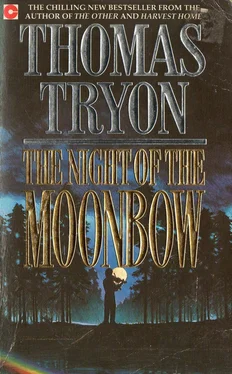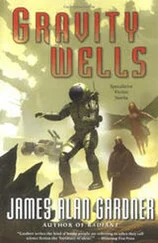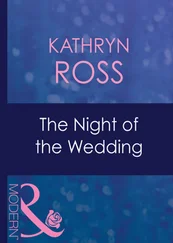Thomas Tryon - The Night of the Moonbow
Здесь есть возможность читать онлайн «Thomas Tryon - The Night of the Moonbow» весь текст электронной книги совершенно бесплатно (целиком полную версию без сокращений). В некоторых случаях можно слушать аудио, скачать через торрент в формате fb2 и присутствует краткое содержание. Жанр: Триллер, на английском языке. Описание произведения, (предисловие) а так же отзывы посетителей доступны на портале библиотеки ЛибКат.
- Название:The Night of the Moonbow
- Автор:
- Жанр:
- Год:неизвестен
- ISBN:нет данных
- Рейтинг книги:3 / 5. Голосов: 1
-
Избранное:Добавить в избранное
- Отзывы:
-
Ваша оценка:
- 60
- 1
- 2
- 3
- 4
- 5
The Night of the Moonbow: краткое содержание, описание и аннотация
Предлагаем к чтению аннотацию, описание, краткое содержание или предисловие (зависит от того, что написал сам автор книги «The Night of the Moonbow»). Если вы не нашли необходимую информацию о книге — напишите в комментариях, мы постараемся отыскать её.
The Night of the Moonbow — читать онлайн бесплатно полную книгу (весь текст) целиком
Ниже представлен текст книги, разбитый по страницам. Система сохранения места последней прочитанной страницы, позволяет с удобством читать онлайн бесплатно книгу «The Night of the Moonbow», без необходимости каждый раз заново искать на чём Вы остановились. Поставьте закладку, и сможете в любой момент перейти на страницу, на которой закончили чтение.
Интервал:
Закладка:
Later, he has a visitor. A woman calling herself Mrs Kranze, who says she knows him. Is she crazy? Leo has never seen her before. A friend, she tells him; she is a friend of his mother’s.
“I want my mother,” he says, as if the saying would produce Emily’s corporeal form. Mrs Kranze’s face is all screwed up, tears are squeezed from her puffy eyes.
“Gone. She’s gone.” She sobs onto his hair. “Poor child, poor, poor boy. What is to become of you now?”
Mother? M-mother? Where is she? The pain in his head is bad; the darkness is coming back, the white room is turning to black, and out of the blackness, the terrible jolt of memory. Something about the bridge? Yes, that’s it – the bridge – the L Street Bridge – his mother – the bridge. “Did she go over the bridge?” he asks. “Did she go across?” Mrs Kranze stares at him, biting her lips, the tears running down beside her large nose. “Yes,” she says, at last, “across the bridge.”
Over at Three Corner Cove the darkness was suddenly cleaved as the Oliphants’ porch light came on. In a moment the phonograph began playing:
You go to my head Like a sip of sparkling Burgundy brew And I find the very mention of you Like the kicker in a julep or two.
Honey appeared and sat down on the top step, eating from a dish propped on her knees: Ice cream? Leo wondered. Her hair burnished by the lamplight, she seemed to go with the music; she was sparkling burgundy, and he wished he were sitting next to her. But then-, as he watched, someone else materialized from the shadows. Reece sat beside her until she finished her ice cream and set the dish down. Then he got up and pulled her to him, and they began dancing, to the music.
The thrill of the thought
That you might give a thought
To my plea casts a spell over me.
Still I say to myself,
“Get a hold of yourself,
Can’t you see that it never can be.”
Leo’s heart was doing flip-flops. If he required any schooling in the way of a man with a maid, there it was, chapter and verse, the music, the starlight, the sweet nothings whispered in the ear. That was how grown-ups behaved, he guessed; Reece wasn’t a boy, but a man, a combination of brain, muscles, glamour, and good looks, the flickering flame around which pretty moths like Honey Oliphant were bound to flit. And even after he had fallen asleep he continued to see the pair, turning and turning together, whirling like love phantoms in the dream dark, round and round in each other’s arms while the music played and the moonlight danced on the water of Moonbow lake and there were kisses in the shadows.
The luscious lipsticked damsel with tresses of gleaming gold leaned languidly upon the casement while down below her lovesick troubadour strummed his mandolina and crooned “Come into the Garden, Maude.” The more passionate his song, the more languidly the beauteous creature leaned across the sill, her hand like some pale and fragile blossom as it gestured for her lover to ascend, a la Rapunzel, by making a ladder of her long lustrous looks. The song ended, the troubador flung away his instrument (it was a ukulele) and climbed -or tried to- in order to receive a kiss from his lady’s rosy lips. Success, however, was not in the cards. It was a difficult moment; the weight of the amorous swain loosened the poor damsel’s hair, which when it pulled free revealed Gus Klaus in female disguise, while the troubadour (Zipper Tallon) tumbled to the floor amid shouts and laughter, and the stage curtains (campers’ blankets strung on a wire) swung to.
Cheers and jeers and thunderous stamping of feet greeted the conclusion of the skit, the noise rising to the roof beam from which the famous Camp Friend-Indeed horn chandelier shed upon the scene the glow of some two dozen kerosene lanterns. In the camp’s earliest days Pa and Hank Ives had put the structure together out of the antlers of countless deer, elk, and moose, along with a pair from an African antelope contributed by Dagmar Kronborg and taken from the trophy walls of the Castle itself. More than six feet in diameter, three times that in circumference, suspended on a thick hawser through a block and tackle screwed into the rooftree, the fixture now actually shook, so great was the din.
Until a few years before, the Major Bowes Amateur Night theatricals had been held in the dining hall, but, thanks as usual to the generosity of Big Rolfe Hartsig, who had sent one of his construction crews over to put up the Teddy Roosevelt Memorial Nature Lodge, all such camp activities were now presented in the building on the lower campus, which this evening was filled almost to overflowing; every seat was taken, with the younger fry seated cross-legged on the floor in front of the stage, each camp unit with its respective group of counselors, each counselor doing his best to quell the high-spirited rowdiness that always enlivened such gatherings. Up front the center section had been reserved for staffers and their guests, among whom tonight was Ma’s old friend Dagmar, making her first visit to Friend-Indeed since Stanley Wagner’s malfeasance had led her to bar the Castle to campers. When she walked in, there had been a buzz among the boys – did this mean all was forgiven? – and embarrassed looks, but now, after the third skit of the evening, she seemed one of them again, obviously enjoying herself, her laughter ringing out above that of the loudest camper in the room.
Next to appear, a solo effort, was Mr Jerome Jackson, the Brown Bomber, performing one of his specialties, his famous impression of Fats Waller (“I’se a-muggin’s, boom-dee-ah-dah”). Leo, sitting rather gingerly among his other cabin-mates, glanced around, checking the rows for some sign of Reece, who hadn’t shown up for the entertainment. His nose was out of joint because, having assigned “his boys” his own choice of a skit – “The Kindergarten,” one of his favorites and an old chestnut – he had discovered at the last minute that a switch had been made. Without consulting him, Tiger and the Bomber had persuaded the others to veto the classroom comedy in favor of an idea Leo had gotten while in the infirmary. Learning of the change, Reece had branded the whole business a conspiracy (“A
Jeremian is loyal to his counselor and sticks by a bargain”), and a violation of the team spirit that had always heretofore characterized Cabin 7 (Phil and Wally, out of deference to their leader, had refused to take part), and after dinner he had driven off with Honey Oliphant in the Green Hornet to take in a drive-in movie.
The curtains had closed on the Bomber (to loud whistles and applause), and the succeeding presentation was about to get under way. Once again the rafters shook to hand-clapping, foot-stamping, catcalls, and cheers as Pa made another introduction, venturing the announcement that the Ezekiel cabin’s contribution to Major Bowes Night would be nothing less than the famed entertainment known as “The Old Lady and the Cow” – groans around the hall – or “An Udder Laff Riot” – laughs and applause – the role of the Old Lady to be essayed by that sterling thespian Emerson Bean (now recovered from his poison ivy), the cow jointly by those sterling look-a-likes the Smith twins, otherwise known as the Coughdrops.
Watching this corny routine, the Bomber whispered to Tiger that Ezekiel was attempting either to empty the hall in a hurry or to put the audience to sleep. Having played the rear end of the cow often enough himself, he knew you couldn’t help getting a boffola laugh when the front end, feet crossed, sat down on the rear end, and then both ends sat on the Old Lady, whereupon all three wound up on the floor; but the Smith brothers were woefully inept and in need of rehearsal, while the old, moth-eaten costume, which kept stretching perilously, then sagging, had nothing whatever about it that might be considered bovine. Then Smith-behind got tangled up with Smith-before, Old Lady Bean’s long skirt was heavily trodden upon, and when the fabric tore away altogether, revealing undershorts, printed in sloops and maritime pennants, the unlucky accident produced the single genuine laugh the skit afforded.
Читать дальшеИнтервал:
Закладка:
Похожие книги на «The Night of the Moonbow»
Представляем Вашему вниманию похожие книги на «The Night of the Moonbow» списком для выбора. Мы отобрали схожую по названию и смыслу литературу в надежде предоставить читателям больше вариантов отыскать новые, интересные, ещё непрочитанные произведения.
Обсуждение, отзывы о книге «The Night of the Moonbow» и просто собственные мнения читателей. Оставьте ваши комментарии, напишите, что Вы думаете о произведении, его смысле или главных героях. Укажите что конкретно понравилось, а что нет, и почему Вы так считаете.












